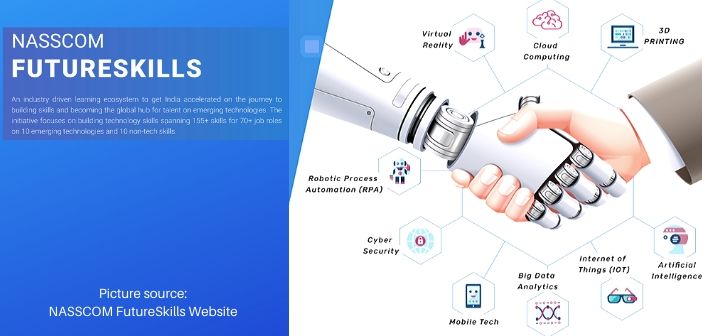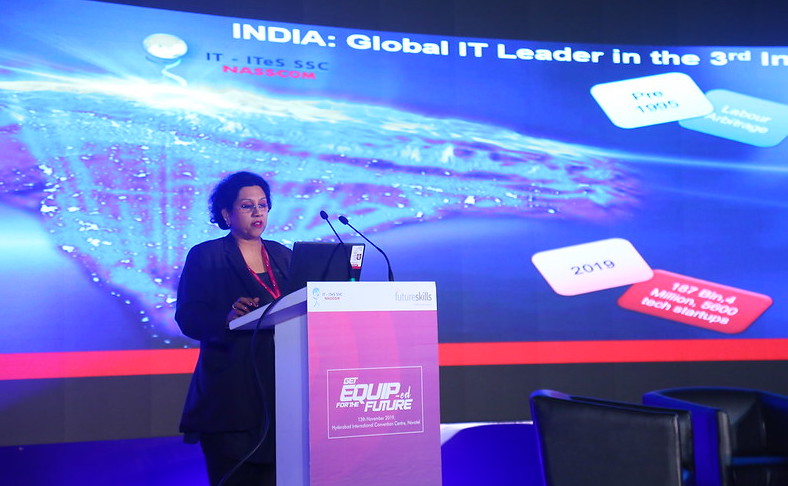While the future of work is getting more technology-driven with collaborative, cross-functional job roles, are the colleges preparing their students for future jobs? Every enterprise is becoming a digital enterprise and the youth must be prepared with future skills for suitable employment. In this Skill Talk, Dr. Sandhya Chintala, Executive Director, IT-ITeS Sector Skills Council NASSCOM (SSC NASSCOM), shares insights on why skills acquire supreme importance with the ability to do and perform. Let’s read on…
Q: How do you assess the current challenges for skilling in jobs in the IT and ITeS sector?
A: Companies and organizations across the world have always been coming to India for quality IT workforce at competitive prices. The industry is expected to grow to 350 million $ by 2020 and we will need both engineering and non-engineering graduates to fill the jobs in IT services and solutions. The question arises: with technology around us changing rapidly, are we equipped to face the challenges of the 4th Industrial revolution?
There are many reasons why other markets are intensifying and competing with India; our demographic dividend will not last much longer. At the same time, with the gig economy gaining ground, freshers and seniors will be competing for the same job. While disruptive technologies will make it a level-playing field for all, there’s anxiety among people in many countries about losing jobs to the migrant population. One of the biggest problems the industry has been facing is the lack of appropriate skills in the workforce.
IT – ITeS industry along with other industries has been changing at an unprecedented pace. The way we live, learn and work is in a constant state of change. Organisations in the future would move away from brick and motor offices, nurturing formal workspaces. We are moving towards an integrated work environment as the gig economy is taking root as every country is keen on safeguarding jobs from a protectionist point of view..
Technology has so deeply penetrated into our lives that our very identity depends on being validated by one’s smart phone and the internet. One cannot stop this transformation and rapid evolution, but together we can make the disruption gainful.
Non-STEM and non-engineering graduates have to skill themselves to avail the new types of jobs and to continuously learn to be gainfully employed. This is essential in making a smooth transition into the world of work and perform as per global standards. To empower students towards this end it also necessitates the desirable levels of training for the faculty, since the nature of jobs is changing at an incredible pace!
Q: What would be the impact of technology-enablement in different industry sectors?
A: There are millions of jobs in the Cybersecurity space but very few takers; this is a domain where the applications are wide-ranging, wherein creativity and design thinking are critical; even non-engineering students are eligible provided he or she has the relevant skills.
Globally, out of 7 Billion people that inhabit the Earth 1.7 Bn work in services, 1.4Bn in agriculture, 1.9 Bn are too young to work, 430 million are unemployed, 800 million are industrial workers and over 400 million are entrepreneurs and the rest are senior citizens. Moreover, in the present work ecosystem, there are well-established indicators that demonstrate that educational programs are de-linked from jobs i.e. unemployment rate rises with education levels; joblessness is highest among graduates and this is not just India’s story but a global one.
Industries like health care, real estate, retail among many others have become technology-enabled. When such is the scenario, where do we as stakeholders, industry, academia and government at large, stand in terms of meeting the requirements of this rapid dynamic change. Are our colleges equipped enough to reskill and upskill people for this digital era?
New jobs that are getting created are cross-functional in nature; it’s going to be influenced by emerging technologies like the Internet of Things (IoT), Big Data, Cloud Computing and Artificial Intelligence (AI) etc. Irrespective of the graduate program one has completed like BA, B.com or B.Sc etc, students from all streams have an opportunity everywhere because most enterprises are transforming into digital enterprises. When we hire candidates for job roles in Cybersecurity, for example, many are from a non-engineering background, because it is not just the technical knowledge that we require but the ability to think differently and design things creatively.
Related article: FutureSkills: A digital initiative by NASSCOM to up-skill technology professionals – Read more: https://nationalskillsnetwork.in/futureskills-a-digital-initiative-by-nasscom-to-upskill-technology-professionals/
Q: What is your vision for young professionals who are yet to join the workforce?
A: Whether it’s agriculture, manufacturing, retail, construction etc., by 2022 the workforce mix would be profoundly transformed, about 37% would be deployed in jobs that are radically changed and about 9% would be in jobs that do not exist today driven by technologies like IoT, AI, Cloud Computing and Big Data. Genomics will become extremely important and impactful in our lives.
Influence of Gig economy
As I said earlier, the future of work would be greatly influenced by the gig economy. People will work part-time for different organizations, from different locations, and across time zones. Scores of students who have qualified via high-quality exams may not matter if they cannot perform and have the ability to problem-solve on the job. Nowadays none of the projects are independently executed, they are all driven by teamwork. So, the students have to be good at everything they do; they need greater industry exposure, learn from updated curriculum, get ready for the new world of work, be keenly aware of latest technologies, problem solve, think differently and smartly hence faculty have to simulate the workplace in the classroom.
What matters most here is the ability to learn and adapt fast. Another important aspect is the adherence to standards and quality in training and skilling. Both domestic and transnational jobs will pursue the same quality standards. Hence, we need to meet global standards for job roles that can open up international avenues and bring in consistency in hiring.
Q: How important is faculty development to implement industry-integrated programs like B.Voc?
A: For this purpose, we implemented the Train the Trainer (ToT) program in the IT-ITeS sector. Prior to the TTT program, we noticed that whenever faculty were not licensed on the job role they intended to teach, the student’s ability to understand and get certified was only about 10 to 15%. However, when faculty were certified, post-training, 85% to 90% was the uptake from the student community.
Colleges must adapt a cross-functional approach in their curriculum
About 156 million jobs are going to be spread across these new technologies in a cross-functional approach. In the current context, institutes should ask themselves which of the courses in their college could be technology-enabled and appropriately counsel bring students into that cohort. Courses should be designed as a combination, such as IT and retail, IT and manufacturing, IT and agriculture and so on and so forth. Being a graduate is not enough anymore. The question is about competency; can he or she do the job? If yes, what kind of job can they do?
Old teaching methods do not work anymore. The teaching should be more cross-functional and ensure horizontal mobility, understanding, and impact. To help and enable educational institutions to easily adopt these practices, we have enabled the required competency empowerment instruments on our Future Skills portal. It makes it easier for educational institutions to pick and choose the courses according to their requirements.
 Q: Please tell us about NASSCOM’s Future Skills initiative and other supporting activities.
Q: Please tell us about NASSCOM’s Future Skills initiative and other supporting activities.
A: NASSCOM’s Future Skills initiative for academia focuses majorly on up-skilling and equipping trainers with the latest skills and knowledge in emerging technologies including key current requirements. They have to understand the power of these technologies to take on the world and impart the same to their students. We can’t restrict the use of mobile phones in classrooms or other devices if the students are accessing, learning content by using those devices, particularly when we are insisting on lifelong and self-learning.
We have developed models to help colleges find the right placements strategies for their students. Each State government has taken on clusters with reference to Universities/Colleges and we are currently working with 5 South-Indian States. We initially formulate MoUs with the States, identify colleges from each cluster within, and train at least two faculty per college. Trainers are trained on current and future skills, as this helps in imparting awareness and knowledge of cross-functional applications to thousands of students on emerging technologies.
Program for Master Trainers by NASSCOM
We have a program for Master Trainers too; Master Trainers are essential to empower and transform faculty /trainers. Both are essential to driving the necessary transformation in this digital ecosystem. However, it is noticed that post the TTT (Train the Trainer), when the trainers/faculty go forth and train students, that is when they need the most help/support. Master Trainers must be officiated to engage with these trained faculty /trainers to continuously support pedagogy models and domain skills. Master trainers could be assigned to address at least 40/50 faculty from about 20 colleges. These Master Trainers may spend about 5-6 hours a week (scheduled) in answering all queries via an online collaborative platform.
We developed many programs for the colleges to readily adapt without having to scrounge around multiple platforms to gather/curate relevant course material. Such content could be integrated with the usual 3-year program, which should aim to address a 70% practical component and 30% theory in the revised curricula. In such programs, conducting exams, giving assignments, assessing students’ performances, etc. should be done online. While assessing students it is essential to note that we are not just assessing their performance but also their competency. This means not just what they know but what they can do/perform as per the job specifications identified for training, must be integrated into their normal program of learning To promote standardization of quality outcomes, we will work with the state governments towards this end.
Introducing Technology-driven subjects into non-STEM courses
It is the right time to introduce foundation courses in areas like AI, Big Data, Data Structures & Algorithms, Computer Fundamentals, and Digital Marketing, etc. as a part of non-engineering/ non- STEM courses. On the FutureSkills platform, we have foundational programs, primers, pathways, etc. with reference to emerging tech, addressing about 1000 hours of free learning and much more. Since technologies like Artificial Intelligence with its sub-sets like ML (Machine Learning) and Deep Learning are getting integrated with sectors like Health Care, Travel & Tourism, Logistics, Telecom, Manufacturing, Retail, Plumbing, Pharmaceuticals, etc. students can seek out jobs in any of these industries as a cross-functional requirement if they are skilled .
The courses on the FutureSkills platform (an aggregator marketplace) are fortified with quality YouTube videos, case studies, TED talks, articles, virtual labs, NPTEL courses /programs and everything else needed to enable awareness, and empower transformation. The competency certificates we provide have our QR code, which means for any domestic or global player this stamp of quality can be verified. It is time we introduce and adopt these changes into our curriculum to make our students future-ready.














Comments 1